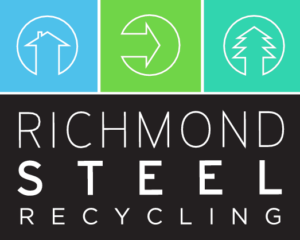A Leader in Scrap Metal Recycling
Richmond Steel Recycling is a leading scrap metal recycler located in the heart of British Columbia. We are committed to the principles of environmental sustainability and work to protect our planet by recycling a wide range of scrap metals. Having over four decades of experience in the recycling industry gives us the edge to maintain top-notch safety standards in addition to providing world-class service.
When a customer calls into Richmond Steel Recycling, firstly, we offer them competitive market pricing for their scrap material. Beyond that, we offer a number of off-site services including mobile auto-crushing and scrap baling services. We are able to provide assistance to your next demolition project. We also can assist with scrap metal services for maritime salvage. And we can help our landfill customers by offering services to help with their scrap metal removal.
With five locations spread across British Columbia, Canada, we support local communities in Western Canada, Alberta, Alaska, and Washington State in becoming green by giving new life to metals recovered from their landfills, demolition sites, and unusable equipment. We offer competitive pricing and off-site services.
Global Experience – Local Service
Richmond Steel Recycling is a joint venture between two publicly-traded companies: Sims Metal Management and Nucor Corporation. We have been recycling metal since 1971 with the vision to become a leader in promoting sustainability by recycling scrap metal. In simple terms, our purpose is to decrease our species’ negative impact on the environment by giving new life to scrap metal.
Our operation works by categorizing scrap metals as either ferrous or non-ferrous. Scrap appliances, automobiles, and other light gauge metals are shredded into small pieces. The ferrous and non-ferrous metals are first separated and then further separation of the debris takes place using blowers and reverse magnets. The metal is then sold to steel mills or smelters for the production of new steel or non-ferrous metals.
When companies extract metal from the earth through various mining processes, they not only harm the environment by causing soil, air, and water pollution but also deplete our planet’s finite natural resources. We believe that a paradigm shift is necessary. We enable businesses across the globe to embrace a circular economy in which commodities that have already been used are not seen as waste but as something of high value, something that can be recycled and reused.
Like any other for-profit enterprise, Richmond Steel Recycling’s financial objective is to make a profit so that we can continue supporting efforts towards environmental sustainability. We achieve this by building long-term relationships with our stakeholders, creating an enriching environment for our employees, using state-of-the-art equipment, and providing world-class service to our large as well as small-volume clients.
Our purpose is guided by our core values of Safety, Health, Environment, Community and Sustainability. We have especially committed ourselves to the safety of our employees in whom we have instilled a mindset of ‘safety above all else’ so as to achieve a zero-harm workplace.
Community is an important part of what Richmond Steel Recycling stands for. We love to involve primary school students in what we do and host field trips to our facilities to educate and inspire young people because we believe that they are the future of sustainability for our planet.
Safety is not just safe practices, which we promote at every opportunity, but it’s also a mindset and core value that we work to inspire across the spectrum of our employees, our customers and our visitors.
Environmental responsibility is a core value that we promote both through our service as a metal recycler but also through our operations, from the care we take in what we accept and what we don’t accept to how we operate our business, with proper storm water controls and materials management.
